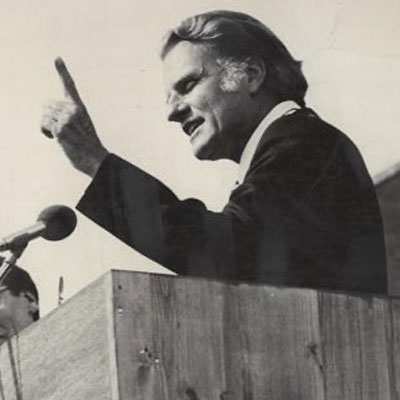(7 November 1918 – 21 February 2018)
FOR IMMEDIATE RELEASE
21 February 2018 – We thank God for the long and fruitful life of Billy Graham, Founder of the Lausanne Movement, as he joins the great cloud of witnesses, for his extraordinary influence and for the model he leaves of a life well-lived and a race well-run. May the Holy Spirit use Dr Graham’s life and death, in his own words, ‘to increase your burden for a lost and dying world, and cause you to rededicate yourself to the priority and urgency of evangelism‘.
Those who are wise shall shine like the brightness of the heavens, and those who lead many to righteousness, like the stars for ever and ever. (Daniel 12:3)
Billy Graham’s anointed evangelistic ministry was accompanied by a shrewdness of mind and far-sightedness.
The story of his legacy through the Lausanne Movement can be traced back to 1955. The then 37-year-old evangelist had been invited by undergraduates in the Cambridge Inter-Collegiate Christian Union (CICCU) to lead a mission to Cambridge University, with 34-year-old John Stott as his chief assistant. These two men formed a friendship which lasted for life. Billy Graham would fill sports stadia around the world, while John Stott’s evangelistic arena remained the university campus. Their joint work in establishing a movement which bound evangelistic passion with theological reflection, and orthodoxy with orthopraxy, was to prove a watershed for evangelicals.
In 1960 Billy Graham convened a small group of leaders and influencers in Montreux, Switzerland, to discuss ways of bringing greater unity among evangelicals. He wrote: ‘After listening to several days of discussion and debate—and after much time together in prayer—I became convinced that evangelicals today would never get together except around one word: evangelism.’ This led to the planning of the 1966 World Congress on Evangelism with Carl Henry and others (Berlin, 26 Oct – 4 Nov 1966). Here 700 invited participants gathered, with an additional 300 Jewish and Roman Catholic observers. Dr Graham’s commanding stature drew 100 journalists and media reporters. Berlin 1966 provided a forum for the growing worldwide evangelical movement, which would act as a spiritual successor of the 1910 World Missionary Conference in Edinburgh.
Billy Graham’s opening greeting in Berlin was clear and passionate:
The elements of spiritual fire are here and could make this Congress as significant in the history of the Church as the World Missionary Conference which was held in Edinburgh in June, 1910. We need a greater comprehension of the world in which we labor. We need a greater unity among the laborers. We need a greater dynamic. We need no new organizations and movements. We need no new message. But we do need a fresh and larger bestowal of supernatural power for the accomplishment of our stupendous task of evangelizing our generation. We need a greater enthusiasm.
Today, if the Christian Church could be aflame with enthusiasm for the Gospel of Christ, with the spirit of burning devotion to the Person of Christ, and with an overwhelming passion for the multitudes still outside Christ, we could change our world.
Plans for Lausanne 1974
Five years later in 1971, Dr Graham convened a meeting to discuss the possibility of another gathering to assess progress since 1966 and to look more thoroughly at major world issues—political, ideological, theological—as they bore on evangelization. A couple of months later, planning began for the gathering, which was to take place in 1974 in Lausanne, Switzerland. It was named the International Congress on World Evangelization (later called Lausanne 1).
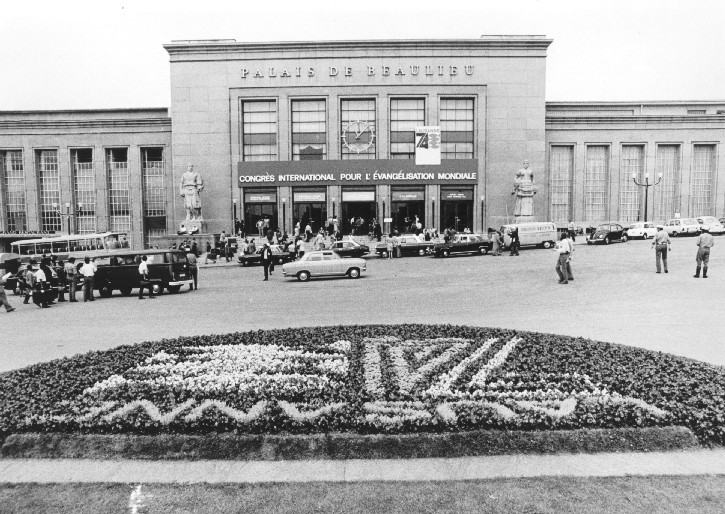
Photo Caption: Participants arrive at the Palais de Beaulieu, the location of the historic International Congress on World Evangelization.
In his opening address at Lausanne I, Billy Graham described four accomplishments he hoped to see:
- ‘I would like to see the Congress frame a biblical declaration on evangelism.’
- ‘I would like to see the Church challenged to complete the task of world evangelization.’
- ‘I trust we can state what the relationship is between evangelism and social responsibility.’
- ‘I hope that a new “koinonia” or fellowship among evangelicals of all persuasions will be developed throughout the world. I hope there will develop here what I like to call “the spirit of Lausanne”.’
He ended the address with the question ‘Why Lausanne?’ and a galvanizing reply: ‘That the earth may hear his voice!’
Speakers included John Stott, Francis Schaeffer, Corrie ten Boom, and the recently converted public intellectual Malcolm Muggeridge. TIME magazine carried a front-page feature on this ten-day meeting which had drawn some 2,400 invited evangelical leaders from 150 countries. Lausanne I was described as ‘a formidable forum, possibly the widest-ranging meeting of Christians every held’, a Congress that ‘served notice of the vigor of conservative, resolutely biblical, fervently mission-minded Christianity’.
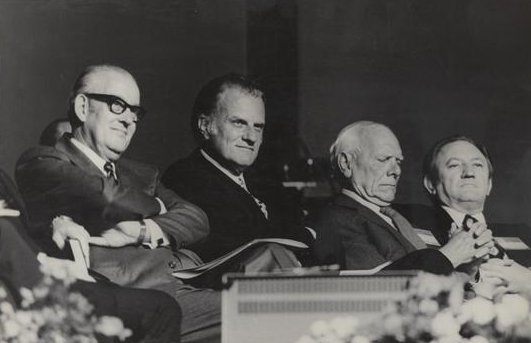
Photo Caption: Billy Graham sits with Bishop Jack Dain, Malcolm Muggeridge, and Jaroy Weber (left to right).
From this Congress issued the biblical declaration that Billy Graham had hoped for, The Lausanne Covenant, with John Stott as its chief architect. The Covenant was to prove one of the most significant documents in modern church history, and to shape evangelical thinking for the rest of the century. It was The Lausanne Covenant which introduced the now familiar term ‘unreached people groups’, energising prayer and work among these many peoples. The need to be saved from the guilt, penalty, and power of sin was always to remain central in the movement’s life; but The Lausanne Covenant also linked evangelical commitment to a ministry of compassion. The Lausanne Movement would become known for ‘holistic mission’.
From 1974, Billy Graham’s phrase ‘the spirit of Lausanne’ gained currency as the way leaders should live and relate: it was, he said, a spirit of partnership, study, humility, hope, and prayer.
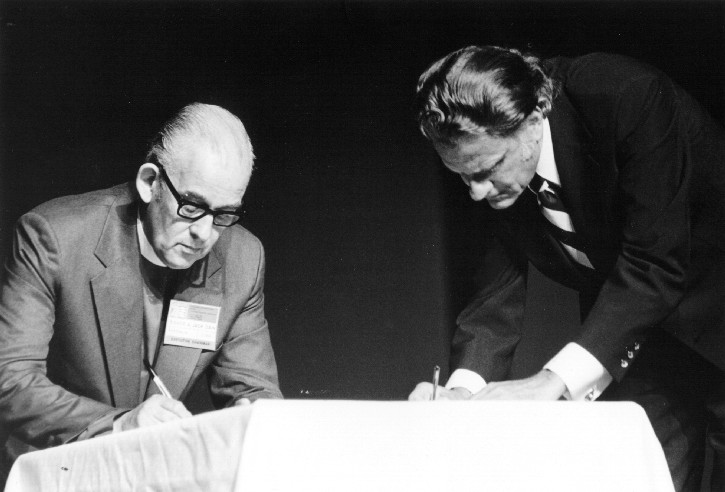
Photo Caption: Billy Graham and Bishop Jack Dain sign The Lausanne Covenant at the International Congress on World Evangelization, 24 July 1974.
Lausanne Movement is established
A Continuation Committee was elected at the Congress, to explore its future. Both Billy Graham and John Stott were among its members. It met in Mexico City in 1975, under the Chairmanship of Bishop Jack Dain. Here the Lausanne Committee for World Evangelization (LCWE, now the Lausanne Movement) was established, and Billy Graham’s brother-in-law, Leighton Ford, was elected its Chairman from 1976. From the beginning it had four working groups: Theology and Education (now Theology), Strategy, Communications, and Intercession. These working groups continue today.
In July 1989, a second Lausanne Congress was held in Manila, Philippines, known popularly as ‘Lausanne in Manila’ or Lausanne ll. From this grew hundreds of new strategic partnerships, mainly in the majority world. John Stott served as chief architect of The Manila Manifesto.
The Third Lausanne Congress on World Evangelization held in October 2010 drew 4,000 invited evangelical leaders from 198 nations to Cape Town, South Africa, to hear what the Holy Spirit is presently saying to the church on each continent. The essence of what they sensed is captured in The Cape Town Commitment: A Confession of Faith and a Call to Action. A series of global consultations on major issues identified in this Commitment has recently been launched; Michael Oh, Lausanne Global Executive Director / CEO, was able to bring news of these to Dr Graham in July 2013.
Dr Graham had prayerfully followed preparations for the Third Lausanne Congress. Doug Birdsall, former Executive Director, had kept him and John Stott abreast of its planning. Doug was arranging for them to have a last meeting on earth, to take place in 2007, but sadly this became impossible because of John Stott’s failing health.
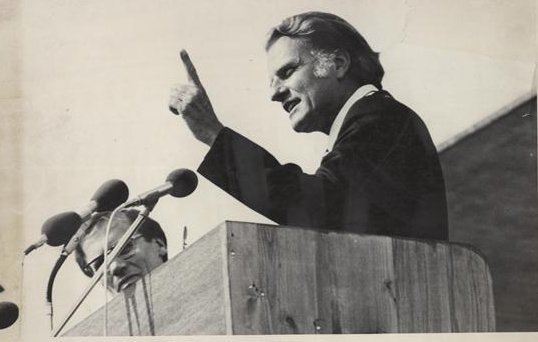
Photo Caption: Billy Graham addresses 2,400 evangelical leaders from 150 countries at Lausanne I.
When interviewed for the August 2006 issue of Newsweek, Billy Graham was asked what he felt to be his most enduring legacy. He ventured that it may have been the outcome of the 1974 Lausanne Congress. While the comment was never published, perhaps due to the surprise element, or more likely the explanation needed for the Newsweek reader, it is at least to be noted.
One of Billy Graham’s last Lausanne greetings was a fax to those gathered in Cape Town:
Thirty-six years ago—in 1974—twenty-seven hundred participants from 151 countries came together for the first Lausanne conference. The world has changed greatly since then—politically, economically, technologically, demographically, and even religiously. One of your tasks during Cape Town 2010 will be to analyze those changes, and to assess their impact on the mission to which God has called us in this generation.
But in all your deliberations, I pray you may never forget that some things have not changed in the last 36 years—nor will they ever change until our Lord returns. For one thing, the deepest needs of the human heart have not changed —the need to be reconciled to God, and to experience His love and forgiveness and transforming power. Nor has the Gospel changed—the Good News that God loves us and sent His only son, Jesus Christ, into the world to forgive us and save us by His death and resurrection. Nor has Christ’s command to His disciples changed—the mandate to go into all the world and proclaim the Gospel, urging men and women everywhere to put their faith and trust in Jesus Christ as Savior and Lord.
I am praying that during your time in Cape Town the Holy Spirit will not only continue what has been done in previous conferences, but that He will increase your burden for a lost and dying world, and cause you to rededicate yourself to the priority and urgency of evangelism. May He also encourage you and refresh you as you gather together in Bible study, prayer and fellowship. As you leave Cape Town, may you go with a renewed commitment to live for Christ, and a fresh determination to walk humbly with Him every day. Never lose sight of your calling, but keep your eyes on Christ every day as you take time to be with Him in prayer and personal Bible study.
We thank God for the long and fruitful life of Billy Graham as he joins the great cloud of witnesses, for his extraordinary influence, and for the model he leaves of a life well lived and a race well run. In the prophet Daniel’s words, he will surely ‘shine like a star’.
#
In case of media inquiries or interview requests, please contact Attila Nyári at media@lausanne.org
#
About the Lausanne Movement
The Lausanne Movement grew out of the 1974 International Congress on World Evangelization convened in Lausanne, Switzerland, by Rev Billy Graham. John Stott was chief architect of The Lausanne Covenant. The Third Lausanne Congress on World Evangelization (October 2010) in Cape Town, South Africa, brought together 4,000 Christian leaders representing 198 countries. The Cape Town Commitment serves as the blueprint for the Movement’s activities.
